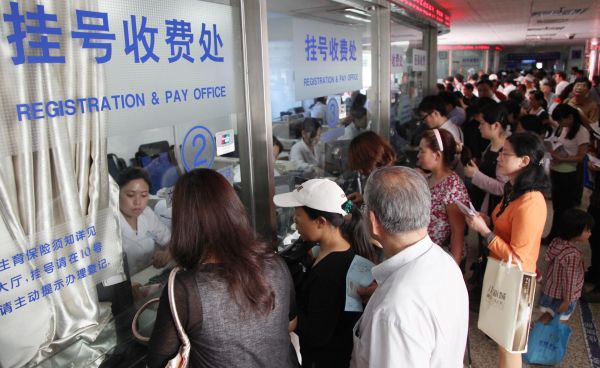


By Shen Nianzu (沈念祖) and Wen Qin (溫鈊)
Issue 615, April 15, 2013
Nation, page 12
Translated by Zhu Na
Original article: [Chinese]
The outbreak of the H7N9 virus has brought with it huge costs for medical treatment, and questions about who should foot those bills.
Wu Xiaoya’s (吳曉雅) husband Wu Liangliang (吳亮亮) died of the illness in Shanghai on Mar 10. She calculated that his medical treatment cost 50,000-60,000 yuan before his passing.
Wu Liangliang was sent to The Fifth People's Hospital of Minhang District of Shanghai on Mar 4, making the average cost of his treatment 10,000 yuan per day. At that time, H7N9 hadn’t yet been announced to the public. The family believed the hospital made mistakes resulting in Wu’s death and asked for 1.07 million yuan in compensation.
On Mar 27, the parties reached an agreement. The hospital agreed to pay 130,000 yuan, of which 100,000 yuan was actually paid through insurance and the civil affairs authority.
This wasn’t the only complaint against the hospital. The son of Mr. Li, who was the first patient to die of H7N9 in Shanghai, is also negotiating with the hospital under the coordination of the Shanghai municipal and district governments.
A public health expert in Shanghai, who spoke on the condition of anonymity, said that the hospital just paid out the settlement in order to prevent the situation from getting worse. He says it shouldn’t have done so.
According to Article 8 of Shanghai’s public health emergency ordinance, funds needed for prevention, preparation and response to public health crises and the related scientific research are included in the annual government budgets at all levels of the city.
On Apr 9, Ms. Han from Chuzhou, Anhui Province died from H7N9. Her hospital had advanced 300,000 yuan for treatment costs to be repaid later. Han’s husband said that the family doesn’t have much savings and that he hopes the government can cover the bill since it was related to H7N9.
According Article 43 of the public health emergency ordinance, governments at or above county level should provide necessary funds to ensure people who are sick due to a public health crisis can get timely and effective treatment. But the regulation doesn’t say whether the government should pay all of the medical costs or just a portion.
During the SARS crisis in 2003, the State Council established a 2 billion yuan SARS prevention fund from the central government budget to be used for treating rural patients and those in urban areas with financial difficulties. Zhong Nanshan (鐘南山), an academic with the Chinese Academy of Engineering, has called for a similar fund to be set up for H7N9 patients.
So far, only Guangdong Province and the city of Guangzhou have set up funds for H7N9. But the specific details about the usage and management of the funds haven’t’ been specified yet. Guangdong Province has stated that treatment costs for H7N9 will be covered by the national medical insurance scheme for rural and urban residents.
The Yangtze River Delta region, where H7N9 first broke out, hasn’t publicly announced the establishment of any special fund.
According to Article 62 of the law on the prevention and treatment of infectious diseases, the government should provide medical treatment and reduce medical expenses for people with financial difficulties suffering from infectious diseases. This problem is that there’s no clear definition for who falls into this category. In practice, people with infectious diseases like tuberculosis have been granted free medical care in the past.
“Money isn’t the first factor to consider,” said Hu Yonghua (胡永華), a professor at Peking University’s School of Public Health. “If an infectious disease is a big threat, the government should take responsibility in order to control it. If medical treatment is delayed because of a patient’s financial situation and the disease is allowed to spread, in the end, the consequence is unthinkable.”
However, Lin Jiang (林江), dean of the Department of Public Finance and Taxation at Lingnan College of Sun Yat-Sen University, says that the pre-condition for using pubic funds to pay for H7N9 treatment should be that the disease can be transmitted between humans. He points to the fact that so far there’s been no conclusive evidence that H7N9 can be transmitted through person-to-person contact, so it should be regarded as a personal health issue.
“If H7N9 receives government assistance, then what about people who get pneumonia or AIDS?” Lin asked. “It isn’t yet time for H7N9 patients to be covered by the government. From a long-term perspective, all things need to be taken into consideration when deciding how to spend the government’s money.”
Hu Yonghua says that currently, when there’s a public health emergency, authorities just look to existing policies for guidance. “If there’s no specific regulation, we don’t know who should pay for treatment,” he said.